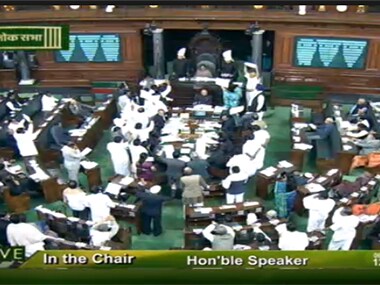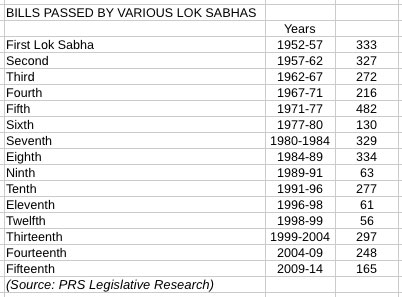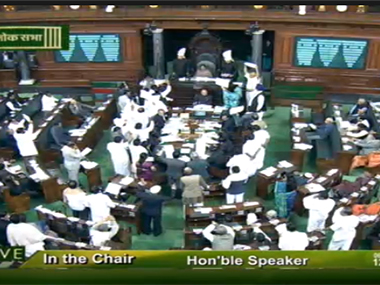There is much tut-tutting among Congress politicians and the commentariat about how the 15th Lok Sabha – thankfully on its last legs now – has been one of the most unproductive in history, with barely 165 bills being passed and 72 pending ones that could lapse at the end of the current session. While one holds no brief for the disruptionists from all parties who ensured this – the BJP during the various scam periods, the regional parties on various local concerns, and now the Congress party itself over the Telangana issue – that fact that fewer bills are being passed as a nation grows older should hardly be a cause for concern. We should celebrate. [caption id=“attachment_1377029” align=“alignleft” width=“380”]  A scene from Lok Sabha on Thursday.[/caption] Excessive law-making is what is making India ungovernable. The USA managed to get by with 27 constitutional amendments in 238 years of independence. That’s one big constitutional amendment every decade. We legislated nearly four times as much in one-quarter the time. We have two constitutional amendments almost every year. A new nation needs many new laws – for it may have none to start with. But after the initial flurry, law-making should decline. In fact, this downtrend was seen in the first four Lok Sabhas after independence. The number came down steadily from 333 bills in the first Lok Sabha, the first one held after we became a republic under a new constitution, to 327, 272 and 216 in the next three Lok Sabhas before spiking up to 482 in the fifth Lok Sabha. I will explain the spike later. Bill passing should come down as a nation matures and focuses on implementing the law rather than investing new ones. Coming to the present Lok Sabha, passing 165 bills in five years is hardly a disaster by any yardstick. It may sound less than the stupendous 482 passed during 1971-77, when Indira Gandhi gave herself an extended tenure during the internal emergency, and it is just over half the average for all Lok Sabhas that lasted five years (317), but consider what this means. Some 165 bills in five years means 33 new bills every year, or nearly three bills every month. (We are oversimplifying, since some of these are routine financial bills). If we are passing three new laws (or even two non-financial ones) every month, how is it ever going to be possible to ensure that each law is properly administered? In the 64 years since we adopted the constitution, we have passed 3,590 bills – and we are only talking about the centre here, and not the states – which makes for nearly 4-5 news laws every month cumulating over so many decades. How on earth can we ever know all our laws in detail and even begin to implement them diligently? It is highly doubtful if even our oldest legislators can name the first amendment to our constitution, which came almost the very next year after we adopted the constitution. Add ordinary laws outside the big constitutional amendments – 3,590 Bills over 60-and-odd years - and it is more than likely that excessive law-making itself may be making them unimplementable. As BJP leader Arun Jaitley told CNN-IBN in an interview on 5 February, “We are an overlegislated country.” If we analyse our occasional bouts of excessive law-making, you will find that more laws are passed whenever the country is going through an authoritarian or one-party phase: the highest number of laws (482) were passed by the fifth Lok Sabha, a part of which came under the internal emergency. This is when needless amendments – like declaring in the preamble that India would be a “Secular, Socialist” republic – were legislated. When the constitution believes in human rights and freedom, and religious freedom very clearly defined and flagged as important, where is the need for declaring ourselves “secular” in the preamble? When we can legislate welfare measures, and also do the opposite by opening up the economy, what is the point in calling ourselves “socialist?” The other big law-making Lok Sabhas were the First ((330-plus bills, and quite understandable), Second, Seventh (Indira Gandhi and the emergency), and Eighth (her son Rajiv with 404 seats). All periods of overwhelming one-party rule with just one leader calling the shots (Nehru, Indira and Rajiv) have been one of excessive law-making. So when commentators tell us that “only165” bills were passed by the 15th Lok Sabha, we ought to ask: so what? Maybe, we should thank our MPs for disrupting parliament enough to avoid legislating several hundred more bills that they won’t implement. In any event, it is not the number of bills that get passed, but their quality, that matters. The current Lok Sabha passed many bills that may do long-term economic damage – like the Right to Food and Land Acquisition Bills. The intent is fine, but these laws are going to tie the hands of future governments – and impossible to delegislate in a democracy. The real tragedy is that bills with a political agenda get passed – especially if they have a populist element which no party wants to oppose. But the really important bills – like the Companies Bill 2013 – wait for years on end, and then get passed almost without much discussion. The Communal Violence Bill – again one driven by the Congress’ political agenda of putting the BJP in the dock – got shot out of the water by a peculiar alliance of regional parties seeking to protect state rights, but why should anyone shed tears over a flawed bill? This is one law less to worry about. The crux of our problem is this: there are too many laws on our statute book that ought not to be there and which cannot be implemented (section 377 that bans unnatural sex, for example); but as we keep putting more and more laws into the book, our ability to implement them diminishes. It is good thing that in a coalition era, fewer laws will be passed for lack of a consensus. That’s the upside. The downside is that the wrong laws won’t go away. Isn’t it time we stopped legislating and begin delegislating the bad laws? We don’t need more laws, but fewer ones, and improved ones. 
India is an overlegislated country. Passing just 165 laws in the 15th Lok Sabha means this time we are less burdened with new laws. But bad laws remain, These need to be weeded out.
Advertisement
End of Article
Written by R Jagannathan
R Jagannathan is the Editor-in-Chief of Firstpost. see more


)

)
)
)
)
)
)
)
)



